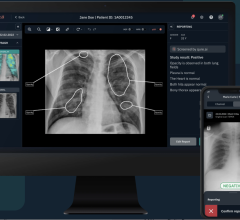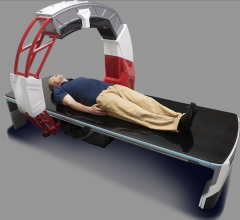
November 24, 2008 - With the SOMATOM Definition Flash dual-source CT, Siemens Healthcare is introducing a CT scanner that aims to set new standards regarding speed and dose reduction.
The system requires only a fraction of the radiation dose that systems previously required to scan even the tiniest anatomical details faster than ever before, according to Siemens. The SOMATOM Definition Flash featuring two X-ray tubes that simultaneously revolve around the patient's body. The fastest scanning speed in CT (i.e., 43 cm/s) and a temporal resolution of 75 ms, enable for example complete scans of the entire chest region in 0.6 seconds. Thus, patients are no longer required to hold their breath during the exam the way they had in the past. At the same time, the SOMATOM Definition Flash operates at an extremely reduced radiation dose. For example, a spiral heart scan can be performed with less than 1 millisievert (mSv), whereas the average effective dose required for this purpose usually ranges from 8 mSv to 40 mSv.
Siemens will present its new SOMATOM Definition Flash CT scanner at the 94th Scientific Assembly and Annual Meeting of the Radiological Society of North America (RSNA 2008) from Nov. 30 - Dec 5 at McCormick Place (Booth #922, East Building/Lakeside Center, Hall D) in Chicago. This new generation of dual- source CT scanners, featuring two X-ray tubes and two detectors, will provide a genuine innovation boost to dual-source technology. The speed of the SOMATOM Definition Flash reportedly offers decisive advantages, especially regarding examinations of moving structures, such as the thorax and the heart. The gantry (i.e., the X-ray detector system surrounding the bore) rotates about its own axis in just 0.28 s. It is this extraordinary rotational speed that enables a scan speed never before attained in CT (i.e., up to 43 cm per second) and temporal resolution of 75 milliseconds, said Siemens. The patient is moved through the CT tube more than twice as fast as with any conventional system. At the same time, scans acquired with the SOMATOM Definition Flash require a much lower radiation dose than conventional scans. While the average effective dose for a heart CT scanner ranges from 8 mSv to 40 mSv, the new Siemens CT scanner gets by with less than 1 mSv. In comparison, the X-ray radiation that everyone is exposed to each year from natural sources amounts to 2 mSv to 5 mSv. The dose values of the new Siemens CT scanner lies below those of an intracardiac catheter examination, thus opening up possibilities for using CT scanners for routine cardiological examinations, according to the company.
For more information: www.siemens.com/healthcare


 August 09, 2024
August 09, 2024 








